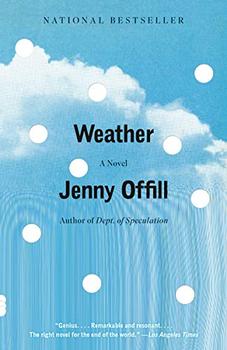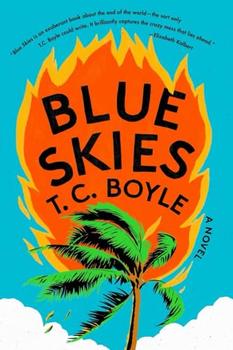Summary | Excerpt | Reviews | Beyond the book | Read-Alikes | Genres & Themes | Author Bio

When I first picked up Jenny Offill's new novel Weather and began to read, it immediately brought to mind one of my favorite novels of 2019: Lucy Ellmann's Ducks, Newburyport. Now, on the surface of things, these two works of fiction could not appear less alike; Ducks, Newburyport clocks in at nearly 1000 pages, made up mostly of a single long sentence with few section breaks, while Weather is less than 200 pages, with plenty of white space throughout. But bear with me here. The thing both novels do—each in its own brilliant way—is to enter the consciousness of a contemporary American woman navigating crises of family and parenting while also grappling with world events, namely the Trump presidency and the impending climate crisis. Both novels validate and celebrate the knowledge and lived experience of their protagonists, and both create immersive, exciting experiences for readers.
This is the first Offill novel I've read, though I know her prior work—especially her Dept. of Speculation—has been widely praised for its rich intellectualism and its delicately crafted prose fragments, both of which are also on display here. As with Dept. of Speculation, Weather is in some ways a portrait of a marriage, as narrator Lizzie contends with the stress imposed on her relationship with her husband by the reentry into their lives of Lizzie's drug-addicted brother, Henry. Henry, whose prior crises derailed Lizzie's graduate studies, initially seems on track for his healthiest recovery to date—complete with a loving wife and a newborn daughter whom he adores. But soon Henry's fears for his daughter's safety—fears stoked in large part by the 2016 election and its aftermath—grow unbearable and threaten to destroy all that's good in his life.
Uncomfortable intersections of political and global phenomena with personal experiences surface again and again in Weather. Like her brother, Lizzie finds her thoughts turning to global crises, particularly the climate emergency and its likely acceleration under a Trump administration. This preoccupation arises in large part from Lizzie's work answering listener questions posed to her former graduate school mentor, Sylvia, whose podcast Hell and High Water has been attracting more and more attention. "What are the best ways to prepare my children for the coming crisis?...How do you maintain your optimism?" These are just a couple of the questions Lizzie fields—with answers that grow progressively more abstract and open-ended as her own certainty collapses in the face of increasingly certain doom.
As Lizzie and her husband ponder how to possibly keep their family, their country and their planet safe, she contemplates how best to keep dread at bay: "I keep wondering how we might channel all of this dread into action?" Is the answer in firearms? In religion? In infidelity? In therapy? In an apocalyptic prepper mentality? Lizzie, who works as a research librarian in addition to the job she does for Sylvia's podcast, finds, if not comfort exactly, then at least food for thought in points from a variety of sources—from Buddhist theology to disaster psychology to world history. These points unfold in sections ranging in length from a page to a single sentence, a structure that invites frequent pauses for reflection during the reading experience. For example: "There's that idea in the different mystic traditions. Of the veil. What if we were to tear through it?"
"How do you maintain your optimism?" That question is at the heart of Jenny Offill's Weather. Although the novel raises far more questions than it answers (and that's part of the point, after all), Lizzie's experience seems to suggest that the answer to this main question lies in understanding and forgiveness—for our families, for our neighbors, for utter strangers and, not least of all, for ourselves.
![]() This review was originally published in The BookBrowse Review in March 2020, and has been updated for the
February 2021 edition.
Click here to go to this issue.
This review was originally published in The BookBrowse Review in March 2020, and has been updated for the
February 2021 edition.
Click here to go to this issue.

If you liked Weather, try these:

by Fernanda Trias
Published 2024
Winner of the Uruguayan National Literature Prize for Fiction, the Bartolomé-Hidalgo Fiction Prize, and the Sor Juana Inés de la Cruz Literature Prize.

by T.C. Boyle
Published 2024
From best-selling novelist T. C. Boyle, a satirical yet ultimately moving send-up of contemporary American life in the glare of climate change.
A book may be compared to your neighbor...
Click Here to find out who said this, as well as discovering other famous literary quotes!
Your guide toexceptional books
BookBrowse seeks out and recommends the best in contemporary fiction and nonfiction—books that not only engage and entertain but also deepen our understanding of ourselves and the world around us.